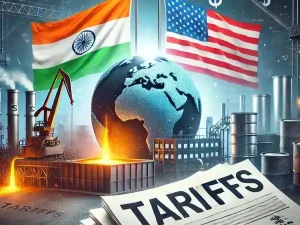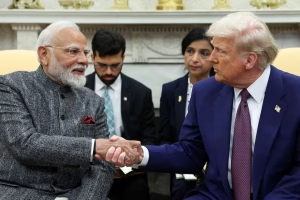New Delhi – India and the United States are conducting crucial India US trade talks in New Delhi today, marking a significant reversal in bilateral relations following weeks of harsh criticism from American officials. The resumption of these India US trade talks represents renewed hope for a breakthrough on a free trade agreement that faced serious jeopardy due to punitive tariffs imposed by President Donald Trump over India’s Russian oil purchases.
The India US trade talks scheduled for Tuesday bring together senior negotiators from both nations for the first formal face-to-face bilateral engagement in months. This high-level dialogue demonstrates the commitment of both countries to resolve their trade disputes and move forward with comprehensive economic cooperation.
Key Negotiators Leading the India US Trade Talks


The India US trade talks feature prominent negotiators from both sides, with US chief negotiator Brendan Lynch arriving in India on Monday evening. India’s chief negotiator Rajesh Agrawal, who serves as special secretary in the commerce ministry, confirmed Lynch’s visit and the scheduled meeting for Tuesday.
Commerce Secretary Sunil Barthwal expressed optimism about the India US trade talks, stating that both sides are approaching the negotiations in a “positive frame of mind” regarding trade matters. This positive sentiment marks a dramatic shift from the tense atmosphere that characterized bilateral relations in recent weeks.
Background of Trade Agreement Disruption

The India US trade talks were previously derailed when President Donald Trump imposed severe tariffs on India in early August. The punitive measures included a 25% tariff specifically targeting India, along with an additional 25% reciprocal tariff, creating one of the highest cumulative levy structures applied to any US trading partner.
These tariffs, which became effective on August 27, were specifically imposed as punishment for India’s continued purchase of Russian crude oil. The India US trade talks that were originally scheduled for August 25 in New Delhi had to be postponed due to this escalating trade dispute, with India describing the tariffs as unreasonable and unjustified.
Also Read: Israel Attack Qatar: Urgent UN Rights Council Debate Begins Today
Recent Diplomatic Shifts Enable Renewed Talks

The current India US trade talks became possible following a notable shift in diplomatic tone from both nations. Earlier this month, President Trump and Prime Minister Narendra Modi exchanged positive public statements, with Trump referring to Modi as a “great Prime Minister” and both leaders expressing confidence in successfully concluding trade negotiations.
This positive momentum for the India US trade talks was further reinforced when Commerce Secretary Howard Lutnick suggested resolution possibilities, stating that the US could “sort it out once they stop buying Russian oil.” Additionally, Sergio Gor, Trump’s nominee for US Ambassador to India, indicated that the two countries were “not far apart” on resolving their trade and tariff disputes.
Contrast with Previous US Criticism
The renewed India US trade talks stand in stark contrast to the harsh rhetoric emanating from Washington in late August and early September. Trump administration officials had previously characterized India as an “oil money laundromat for the Kremlin” and demanded that New Delhi choose between American partnership and Russia-China alignment.
These criticisms intensified after Prime Minister Modi attended the Shanghai Cooperation Organisation Summit in Beijing alongside Russian President Vladimir Putin and Chinese President Xi Jinping. However, the current India US trade talks demonstrate a pragmatic approach to resolving these diplomatic tensions through structured dialogue.
Framework for Bilateral Trade Agreement Progress
The India US trade talks are building upon the framework established earlier this year for a comprehensive Bilateral Trade Agreement (BTA). Both countries agreed on February 13 to conclude the first tranche of this agreement by October 2025, setting an ambitious timeline for negotiations.
The detailed terms of reference for the India US trade talks were finalized on March 29, providing a structured approach to the complex negotiations. US Vice President JD Vance officially announced the completion of these terms during his April 22 visit to India, describing it as “a vital step toward a final deal” between the two nations.
Expectations for Tuesday’s Meeting
Today’s India US trade talks are expected to pave the way for the sixth round of formal trade negotiations, which represents a continuation of discussions that have been ongoing through virtual channels despite the temporary suspension of in-person meetings.
Both sides have described the current India US trade talks as maintaining “continuous and constructive” engagement, suggesting that diplomatic channels remained active even during the most challenging periods of the relationship.
The success of these India US trade talks will likely determine the trajectory of one of the world’s most important bilateral economic relationships and could establish a template for resolving complex trade disputes in the modern global economy.

